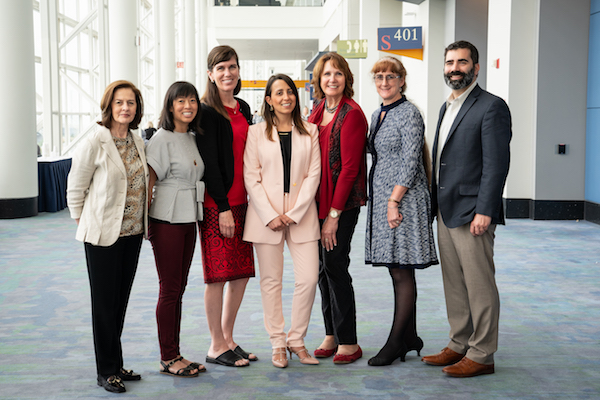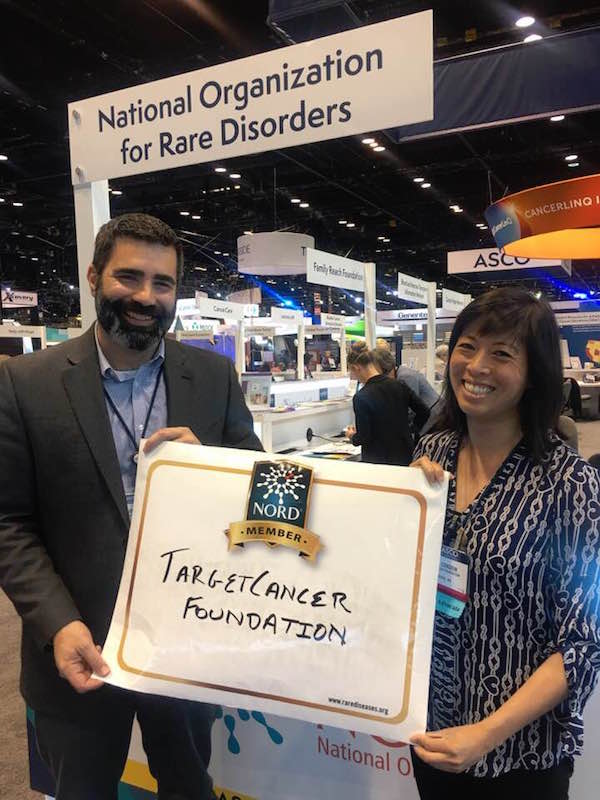By TargetCancer Foundation Advocacy Council Chair Leslie Condon
When I walked into McCormick Place on the first day of this year’s annual ASCO Conference, I was instantly swept into the sea of oncologists, researchers, pharma reps, and others from the medical field who had also descended upon the city for the weekend. Prior to attending the ASCO Conference as a first-time recipient of one of their Patient Advocate Travel Scholarships, I was told how overwhelming the event could be. Thankfully, my extensive prepping (and fascination with the ASCO i-Planner app) allowed me to quickly orient myself within the maelstrom and navigate to my first session, “Talking With Patients About Risk and Uncertainty.” It was one of the many patient-focused sessions being offered at ASCO during the conference, and one of two tracks that I had chosen to follow during my time there.
Patient and caregiver advocacy and support is an area I am personally invested in. My sister passed from cholangiocarcinoma in 2015, and I came upon TargetCancer Foundation only a few months after while seeking ways to become active within the general cancer community. To be honest, I was also grief-stricken, and still processing the feeling of hopelessness that had crept up in the midst of my sister’s long battle. So much of it was due to my lack of knowledge of the healthcare system, of cancer treatment, and, of course, the research that could lead to better treatment therapies. Throughout my sister’s treatment, I felt unable to articulate any of my questions and concerns effectively, like a child still learning to form words. Yet, two and a half years later I was sitting in a room with researchers and oncologists who were also looking to bridge that gap. It brought me comfort knowing that the medical field recognized this common issue and was also striving for better.
During the Patient Advocate Luncheon at ASCO the next day, I had the pleasure of meeting other advocates who had also come to this work through a variety of circumstances, many of them cancer survivors themselves. Their passion was contagious and amplified my own desire to grow as an advocate. One fellow advocate supported male breast cancer awareness, while another worked for a Colorado organization that provided cancer survivors and caregivers with hiking opportunities in the Colorado Rockies. I also chatted with a fellow from an NY-based skin cancer foundation who discussed fundraising strategies within the cancer community.
As I glanced through the doorway of the Patient Advocate Lounge, I wondered how cancer survivors and caregivers experienced the ASCO conference in contrast to the many dedicated oncologists and researchers who were traversing the corridors to their next session. Apart from the lack of formal medical training, there was an obvious undercurrent of emotion that was present throughout. And, why not? If anything, working within the cancer community gave us the courage to be open about our fears and sadnesses but also the joys.
While I was familiar with discussions around patient and caregiver support, I was eager to gain knowledge on broad-scale cancer treatment. ASCO’s global health track, the second one I followed, included several in-depth sessions on international efforts in comparison to our domestic policy. One such session, “Global Access to Essential Cancer Medicine” emphasized the need for access not only as a humanitarian priority but as a means to accelerate research in all areas of cancer research. This is especially true for rare cancers, as discussed in another session, “Global Health Perspective in Sarcomas and Other Rare Cancers.”
Finding breakthroughs in rare cancer therapies is a collective effort. When my sister was diagnosed, our family was incredibly fortunate to have friends and family who were able to support my sister’s trips to MD Anderson, and treatment at Massachusetts General Hospital. Due to their generosity, my sister was able to participate in a number of treatment trials and eventually receive “off label” and “compassionate use” therapies. Even though she eventually failed out of these trials and therapies, her results still contributed to crucial data gathering and research.
Unfortunately, not everyone has the financial ability to participate in such trials. The financial burden is a large consideration in relation to other factors, such as ease of travel, frequency of treatment, and caregiver support. This combination of factors, in addition to medical ineligibility, often result in a pool of participants with little ethnic and socioeconomic diversity. A 2016 article from the American Society of Clinical Oncology entitled, Role of Clinical Trial Participation in Cancer Research: Barriers, Evidence, and Strategies, outline the specific reasons why only about 5% of adult cancer patients participate in clinical trials within the United States, and the importance of changing this dynamic.
The consequences are high: without a highly diverse pool, we ultimately lower our probability of finding new therapies for all patients. Conversely, researchers have found a strong correlation between demographic participation in clinical trials and survival prolongation across the entire population. Treatment options and support resources improve for patients of a given demographic who are represented in high numbers within any cancer trial, whether by age, ethnicity, gender, or socioeconomic status. These findings speak not only to the importance of diversified trials but the need for affordable healthcare and more intentional strategies for supporting all cancer patients.
It may seem like I followed two disparate tracks during my time at this year’s ASCO – one focused on the individual patient and families, and the other focused on abstract populations abroad. However, the several sessions I attended on both topics reinforced one absolute: cancer as a disease follows no boundaries. Oncologists, researchers, and surgeons from all over the world attended these same sessions with me. Wherever their home, they were equally invested and committed to the improvement of treatment for their patients and communities. In fact, many have already come to America seeking opportunities to support our national efforts and to help our medical communities find breakthroughs in treatment.

A thrilling example is Marina Baretti, MD, a current postdoctoral research fellow at John Hopkins University. Dr. Baretti was awarded the 2018 Conquer Cancer Foundation Young Investigator Award in Cholangiocarcinoma, in partnership with AMMF – The Cholangiocarcinoma Charity, The Bili Project Foundation, The Cholangiocarcinoma Foundation, and TargetCancer Foundation. Originally from Milan, Dr. Baretti earned her undergraduate degree from the Università di Pisa and doctorate degree from Scuola Superiore ‘Sant’ Anna’ di Studi Universitari before eventually coming to America as a researcher. We are grateful for the passion Dr. Baretti brings to her work, and also her deep understanding of the individual challenges cholangiocarcinoma patients face daily.
The last session I attended at ASCO, Managing Cognitive Changes in Cancer Survivors, was a reminder of the difficult realities faced by patients and their caregivers. Yet, it was also a reminder that more and more rare cancer patients are living longer lives due to the efforts of organizations like ASCO and TargetCancer Foundation, and due to the critical work of research and patient advocates. As mentioned before, this is a collective effort – made tangible by our amazing community.
Now that I’ve had time to reflect on that long weekend in Chicago, I continue to feel grateful for what I’ve learned and the people I spent time with at the conference, including Dana Deighton, Lisa Craine, TCF Executive Director Jim Palma, and especially Melinda Bachini. I didn’t tell her at the time, but my sister looked to Melinda’s exceptional story as a sign of hope. We can only progress forward, in the research and their outcomes, by remaining hopeful despite shifting policy changes that directly and indirectly undermine our national health. And hope also comes from empowering ourselves with evidence-based knowledge. Over the course of serving as TCF’s Advocacy Council Chair, it is the patient and family stories, told with joy, sadness, and hope, that has spurred my efforts on. My ASCO experience has further emboldened me to speak more openly on the issues that impact our patients and family. I hope you will follow along as our community continues exploring these topics together.

